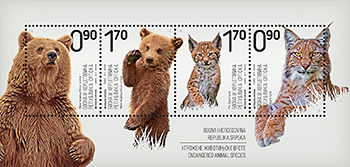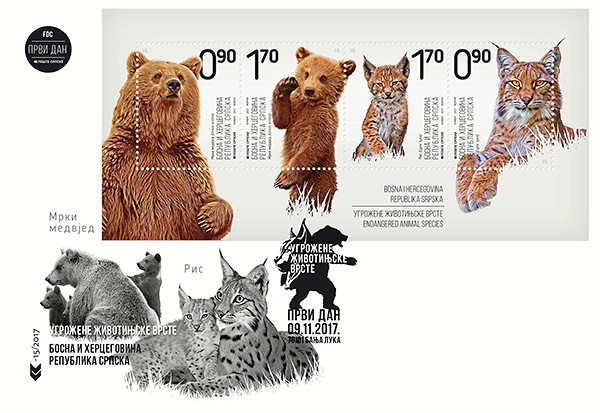Endangered Animal Species
Title::Endangered Animal Species
Date of Issue:09.11.2017.
Author:Nebojsa Djumic
Type edition:commemorative
Printing techniques:multicolour offset
Sheet:block
Paper:muflep 100g
Printing House:Forum, Novi Sad
 Motive:Black bear and Lynx lynx
Motive:Black bear and Lynx lynx
Catalogue no.:750, 751, 752, 753
Perforation:13 3/4
Face value:5,20 KM
Quantity:15 000

Biodiversity on Earth today consists of millions of different biological species, which are the product of 4 billion years of evolution. Although the extinction of animals is part of the natural cycle, the presence and domination of people on Earth has accelerated the rate at which species disappear. The number of endangered species worldwide is growing.
According to the data of the International Union for Nature Conservation (IUCN), Bosnia and Herzegovina has 55 endangered species. In 2012, Republic of Srpska adopted a Red List of protected species of flora and fauna. One of the species that is on the Red List and belongs to endangered species in our country is the lynx. Lynx lynx is a beast from a cats family that is recognizable by the hairy black tassels on the ears. The main prey is deer, chamois and loirs, and the main natural enemies are wolf and bear. In addition to natural enemies, the greatest danger to lynx is man who deals with the pouching and hunts him for fur and trophies. Lynx was declared a permanently protected species in Bosnia and Herzegovina because it was already exterminated at the beginning of the 20th century. In Bosnia and Herzegovina, the lynx reappeared after reintroduction in Slovenia and, according to current data, the population counts about 60 individuals.
Black bear (Ursus artcos) belongs to the largest wildlife in Bosnia and Herzegovina. Its body length can be up to 2.8 m and weight up to 300 kg. It is mostly herbivorous, but eats meat whenever it is available. During winter, because of food shortages, it goes into hibernation and spends time in the lagoon. Due to the changing conditions in their natural habitats, bears descend to the lower parts in search for food and attracted by landfills come to human settlements and cause damage that leads to fear among the human population. In order to prevent this, we need to provide feeding for bears in their habitats, which will retain them there. The number of bears in the Republic of Srpska is about 700 individuals.
Author: Nebojsa Djumic
Publisher: Poste Srpske a.d. Banjaluka
Cooperation: Tatjana Borenovic
 1371
1371  kontakt@postesrpske.com
kontakt@postesrpske.com


